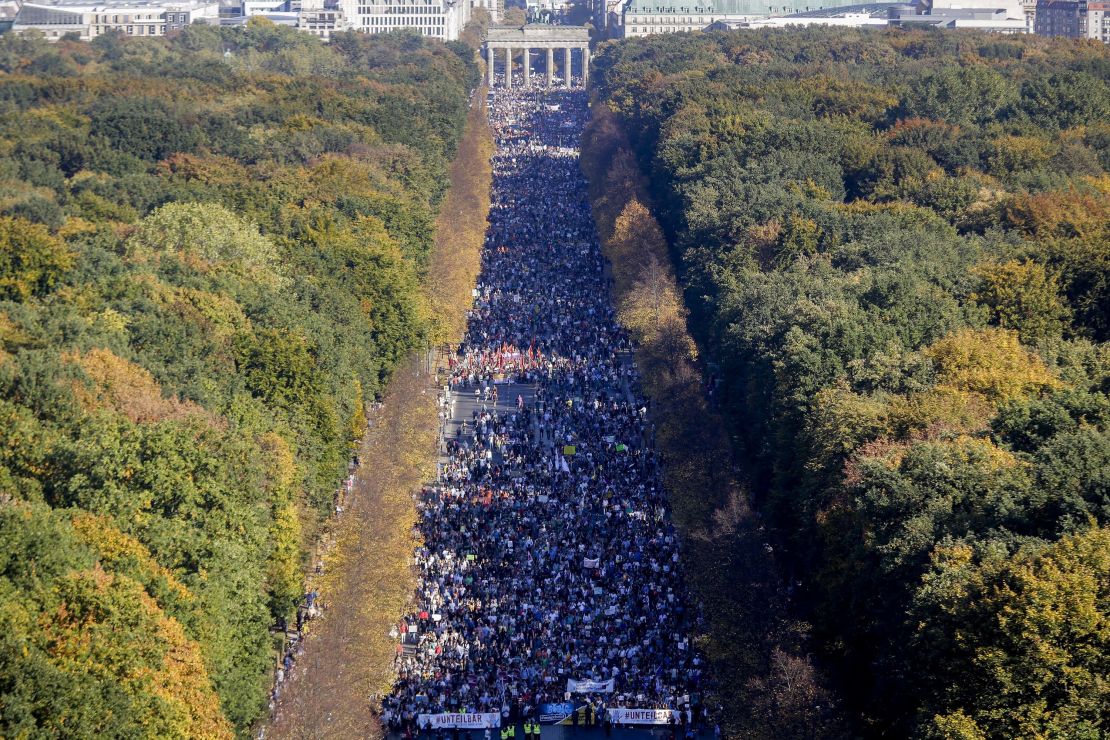The elections in the state of Bavaria on Sunday suggest a shift is underway among some German voters – and the future is looking a lot greener.
Despite big gains by the far-right Alternative for Germany (AfD), it was the Green Party, pledging to fight climate change and gender inequality and to reduce border controls, that surged into second place.
The Greens more than doubled their share of the vote, winning 17.5% in the traditionally conservative state. And with polls estimating that most of their support came from voters under the age of 60, results like those could soon become the norm.
The dismal result for the Christian Social Union (CSU), the Bavarian sister party of Chancellor Angela Merkel’s Christian Democrats (CDU) that has ruled the state almost solidly for the last seven decades, seems to endorse that prediction.
Not only did the party drop 10 percentage points to 37%, its worst election result in decades, but the biggest loss was because of voters having died since the last election. And, according to pollsters, the bulk of its support continues to come from those over 60, suggesting further losses could be likely in future elections.
“We have not achieved a good result. We have achieved a painful result,” said Markus Soeder, head of the CSU in Bavaria, after the preliminary results. “We accept this result with due humility and we will have to learn our lessons from this result; we have to analyze this result.”

The Green Party has long been a strong force in parts of Germany and has ruled as part of a coalition government in several states, and on the federal level between 1998 and 2005.
But the party is not traditionally successful in conservative Bavaria – and Sunday’s vote bucks a broader trend that has seen the party lose seats in several recent state elections.
So, what happened to shift the vote this time?
First, the surging Green vote was in part a protest vote against the CSU, which has been ramping up its anti-immigration rhetoric in an attempt to counter a mass defection to the AfD.
In the run-up to Sunday, CSU politicians were busy trumpeting the “migration master plan” – the pet project of CSU head and Interior Minister Horst Seehofer – that would see a crackdown on asylum seekers and the acceleration of deportations.
Earlier this year, the CSU made it mandatory to hang a Christian cross in the foyer of every public building in Bavaria, staking its claim as the state’s most pro-Christian – and, by implication, anti-Islam – party.
AfD figures openly mocked the CSU for imitating their hard-line nationalism.
“The CSU is basically our best campaigning body!” AfD candidate Katrin Ebner-Steiner told CNN before the election. “They try to take over our issues, they take on our rhetoric and look what happens. I can only say thank you CSU for your campaign support!”
But less than two weeks before the election, more than 20,000 people took to the streets of Munich to demonstrate against the CSU’s tougher anti-immigration policy and the AfD – a protest that was echoed and amplified in Berlin last weekend when more than 100,000 people demonstrated against racism and right-wing extremism.

Second, immigration was not the biggest voter issue. The AfD was counting on residual anger from the arrival of hundreds of thousands of migrants and refugees in 2015 – many of whom crossed into Germany at Bavaria’s southern border – to drive people to the polls.
But, according to an Infratest Dimap poll, immigration came in behind education, housing and climate change on a list of voter priorities, all big campaign topics for the Green Party.
Third, a lot of the focus has been on right-wing, conservative voters deserting traditionally centrist parties for the nationalist fringes. But the change is even more dramatic on the left. The Social Democrats (SPD) – traditionally one of Germany’s biggest parties, alongside the CDU/CSU – suffered a catastrophic loss, dropping to a meager 9.7% of the vote with many of their lost votes going to the Greens.
”We did so badly in this election. This is something we will need to analyze very carefully on all levels,” said Andrea Nahles, the visibly shaken SPD party leader, on Sunday evening. “It would seem we were unable to convince the electorate and that is a bitter lesson.”

Initial analysis of voting patterns by age suggests the SPD is facing the same dismal prospect of a dwindling support base as the CSU, with younger voters deserting the center-left party. Just 7% of 18- to 44-year-olds voted for the Social Democrats, compared to 14% of the over-60s.
By contrast, more than 20% of 18- to 29-year-olds threw their support behind the Greens.
The co-leader of the national Green Party, Robert Habeck, told radio station Deutschlandfunk on Monday that he’s optimistic that change is happening, but cautioned against any expectation of a Green revolution any time soon.
“I think the blow from Bavaria was so strong – an earthquake – that for now nothing will happen. People will continue to cling to what power they have. But the ground has opened and those who now take a step will fall into it,” he said in the interview.
”It is not all wrong what they do in Berlin,” Habeck said, referring to the much-maligned grand coalition between the CDU/CSU and SPD. “It is just not explained in a way that people feel taken care of. The big challenges are simply not addressed.”
Atika Shubert wrote in Berlin and Judith Vonberg wrote in London.


